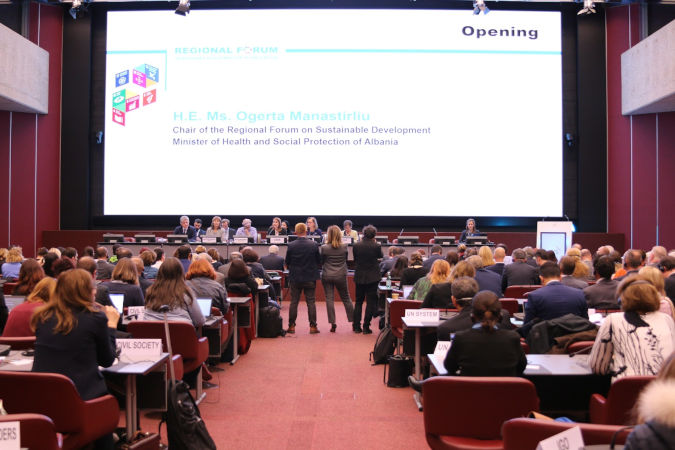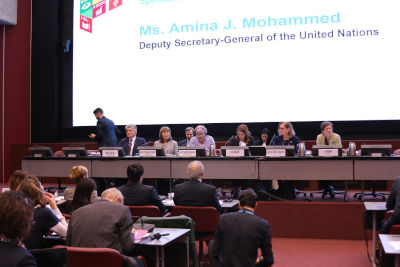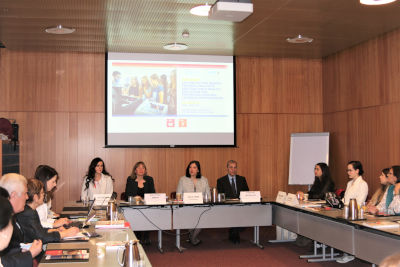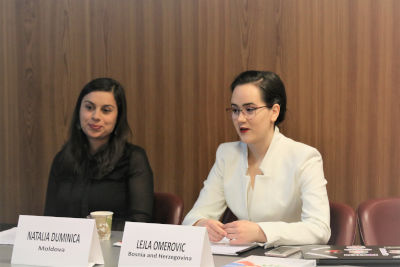Gender equality reaffirmed as a key driver of the 2030 Agenda for Sustainable Development
At the Regional Forum on Sustainable Development for the United Nations Economic Commission for Europe (UNECE) Region, gender equality and the empowerment of women and girls were recognized as key drivers for the achievement of all the Sustainable Development Goals (SDGs).Date:

Spanning two intense days of sharing experience and discussing concrete solutions on how to achieve the 2030 Agenda and its Sustainable Development Goals in the UNECE region, the Regional Forum on Sustainable Development (RFSD) ensured that achieving gender equality and women’s empowerment is integral to each of the 17 goals.

"Despite notable gains, progress to close the gender gap has been limited and has to go much further. Gender equality is one of the drivers moving the 2030 Agenda forward," said Amina J. Mohammed, Deputy-Secretary-General of the United Nations at the opening of the Forum.
Ogerta Manastirliu, the Minister of Health and Social Protection of Albania and Chair of RFSD opened the Forum by spotlighting the criticality of Sustainable Development Goal (SDG) 5 on gender equality for the achievement of all the goals. “It is crucial that while we strive for progress, we should leave no one behind, ensuring that our societies do not suffer from inequalities and exclusion,” reaffirmed Minister Manastirliu.
At this year’s forum, specifically SDG 4 on Quality Education, SDG 8 on Decent Work and Economic Growth, SDG 10 on Reduced Inequalities, SDG 13 on Climate Action and SDG 16 on Peace, Justice and Strong Institutions have been reviewed and discussed by member states, international organisations, including UN agencies, civil society representatives, academia, and experts. Young voices have also been heard at the Forum and young people were able to contribute to the sessions.
UN Women Regional Office for Europe and Central Asia (ECA RO) ensured that gender equality and women’s empowerment took centre stage during the round tables and other discussions.
“The ‘quarter of a century’ review of Beijing Platform for Action implementation [Beijing+25] provides us with a good momentum to call together all UN Member States to agree and jointly implement a clear roadmap for turning gender equality into action,” said Alia El-Yassir, UN Women Regional Director for Europe and Central Asia, highlighting the intersections between the implementation of the 2030 Agenda and Beijing Platform for Action.

UN Women organized a side event on the intersections between SDG 4 on quality education and SDG 5 on gender equality, together with the National Commission of Romania for UNESCO and UNESCO Regional Bureau for Science and Culture in Europe. A vibrant group of representatives from member states, civil society, academia, international organisations and the youth discussed the importance of ensuring inclusive and equitable quality education and promoting lifelong learning opportunities for all.
At the discussion moderated by Alia El-Yassir, UN Women Regional Director for Europe and Central Asia, participants agreed on the following urgent actions:
- The need for gender inclusive policies,
- Capacity development as an entry point for greater inclusion,
- Awareness-raising and outreach to tackle gender stereotypes and unconscious biases,
- Quality disaggregated data to measure progress,
- Giving space for a younger generation for providing their solutions.
"I call upon governments to undertake necessary measures to address patriarchy and advocate for the education of Roma girls so that they realize their full potential," said Natalia Duminica, UN Women’s partner in Moldova in advocating for the rights of Roma women and girls.

“Technology is for everyone. Give us a chance to speak about our solutions,” called Lejla Omerovic, a high-school student in Bosnia and Herzegovina that is part of UN’s IT Girls initiative that is managed by UN Women, UNDP and UNICEF in Bosnia and Herzegovina.
At a Side Event hosted by the Permanent Missions of Switzerland and Iceland, in partnership with the Equal Pay International Coalition (EPIC) Secretariat, OECD, ILO and UN Women Regional Office for Europe and Central Asia, high-level government representatives, trade unions, civil society and the international community discussed the issue of equal pay for the work of equal value, shared knowledge and exchanged good practices on how to accelerate the achievement of equal pay. They called for urgent action to ensure equal pay for work of equal value by adopting the right policies and requiring companies to implement transparent pay measures.
UN Women also co-moderated the Round Table on SDG 8, decent work and economic growth. Ms. El-Yassir stressed that women contribute actively to social and economic development as workers, entrepreneurs and service providers but their economic and human rights, their contributions and priorities have been largely overlooked. She added the necessity to acknowledge the central role played by gender equality (SDG 5) in sustaining SDG 8.
The Chair’s summary of the Regional Forum will provide the region’s official input for the High-level Political Forum (HLPF) which will be held in July in New York. UN Women will follow-up with the discussions held at the Forum during the 25th year review process of the Beijing Declaration and Platform for Action, which will be linked with the commitments of the 2030 Agenda and the SDGs.